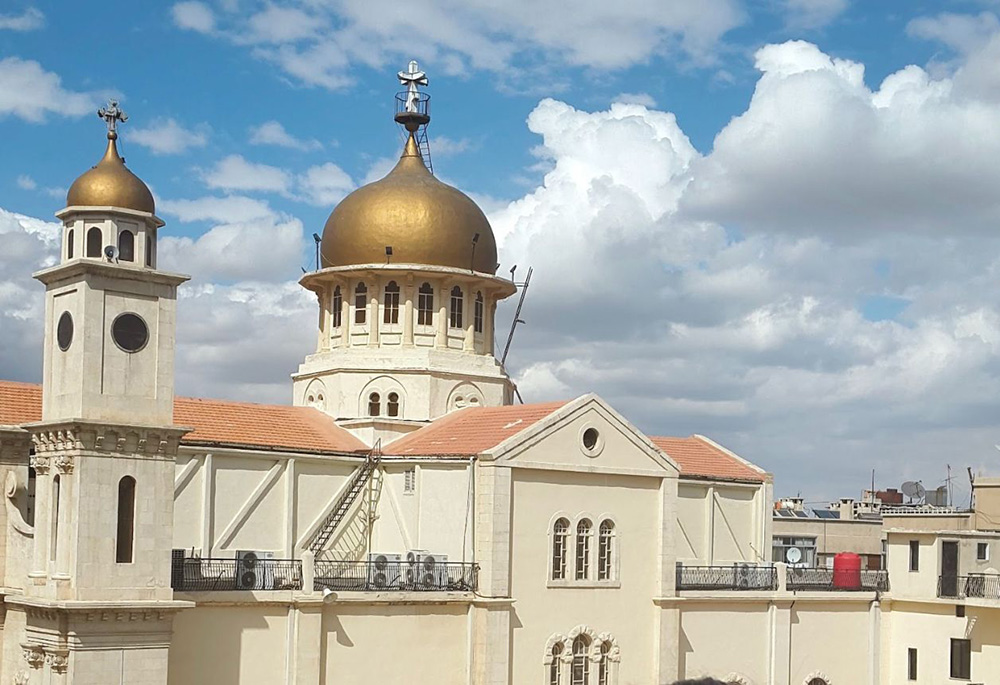
It was a quiet morning. As I walked through the chapel, the soft rays of the rising sun illuminated the altar, casting long shadows on the floor. The stillness of the space invited me to linger in prayerful reflection. I had just finished my morning prayers and found myself contemplating the profound mystery of the Incarnation — a moment in history that forever changed the world. Yet, as I sat there, a question stirred within me: How often do I truly live the Incarnation in my daily life?
As I reflected, memories of my childhood in Syria came flooding back. Growing up in the Middle East — the very region where Jesus was born — Christmas always held a special significance. I remember the joy of midnight Mass, walking through streets adorned with lights and decorations, the sound of Christmas music filling the air, and the laughter of children posing with Santa Claus on every corner. These simple yet profound moments remain etched in my heart.
I now wonder how Christmas feels today for those still living in Syria, for my loved ones, and for countless families whose lives are marked by fear and uncertainty. How does one celebrate when stepping outside might feel unsafe? How does one find joy when their home has been reduced to rubble? For many, the streets that once echoed with festive music now resound with silence — or worse, the distant noise of conflict. And yet, the resilience of those who continue to celebrate in small, meaningful ways reminds me that the spirit of Christmas cannot be extinguished.
I now wonder how Christmas feels today for those still living in Syria, for my loved ones, and for countless families whose lives are marked by fear and uncertainty.
It is in these reflections that I am reminded of the true nature of the Incarnation — the moment Jesus took flesh and entered our world. It is not merely a past event confined to the annals of history. It is a living, breathing reality, an ongoing invitation to embody God's presence in our actions, choices and relationships.
This profound mystery is not meant to be fully understood by the intellect but rather absorbed into the heart and expressed in the way we live. It reveals both the nature of God, who chose to share fully in our human experience, and the sacredness of every human person. By choosing to enter our joys and struggles, our sorrows and triumphs, God invites us to make his presence tangible through our love and compassion.
Advertisement
I recall my early years in Lebanon, where my journey as a religious sister began. We, as sisters, would gather children and their families for Christmas celebrations. We organized simple parties, shared gifts, and created moments of joy for those in need. That work continues to this day, with our sisters tirelessly bringing glimpses of Christmas into homes weighed down by struggle and uncertainty. For me, this has always been a living expression of the Incarnation: God's love becoming present in the small acts of kindness that make the invisible visible.
As a Good Shepherd Sister, the writings and wisdom of St. John Eudes and St. Mary Euphrasia Pelletier deeply shape my understanding of the Incarnation. St. John Eudes, our spiritual father, reminds me that the Incarnation is not just a historical memory to be celebrated once a year; it is a dynamic reality that calls us to allow Christ to take flesh in our hearts and actions.
This has always been a living expression of the Incarnation: God's love becoming present in the small acts of kindness that make the invisible visible.
St. Mary Euphrasia, our foundress, saw waiting not as an empty pause but as a space where God's grace unfolds, where trust in his timing transforms our lives. Her words guide me daily, helping me approach challenges with faith that even in moments of uncertainty, Christ is with us, working quietly in the background.
The Gospel echoes these truths in its account of Jesus' birth: "And the Word became flesh and made his dwelling among us, and we saw his glory, the glory as of the Father's only Son, full of grace and truth" (John 1:14). This verse is more than a statement of what happened in Bethlehem some 2,000 years ago. It is a proclamation of what continues to happen today in every heart open to God's transformative love.

The sun rises over Damascus, the morning after rebels seized the capital and ousted President Bashar Assad, in Syria, on Dec. 9, 2024. (OSV News/Reuters/Amr Abdallah Dalsh)
Amid the hardship and waiting faced by so many in Syria and Lebanon, I see the Incarnation alive in the resilience of the people. I see it in the sisters who continue their ministries despite obstacles, in families who manage to find moments of joy even in adversity, and in every small act of love that lights up the darkness. These quiet expressions of hope and faith remind me that Christ's presence remains with us, even in the most challenging times.
This year, as I reflect on Christmas, I realize anew that the Incarnation is not a passive event. It is a living invitation — a call to embody God's love in our everyday lives. To live the Incarnation is to make space for Christ in our hearts, to let him transform how we love, serve and bear witness to his presence in the world.
Often, it is in the smallest, quietest acts of service and moments of waiting that we encounter the profound reality of the Incarnation. Just as Christ entered the world in the stillness of night, He continues to enter our lives in the silent spaces of prayer, in the warmth of community, and in our compassionate outreach to others.
As the saying goes, "Be faithful in the little things, for in them lies your strength." It is often in these small, seemingly insignificant moments that we live out the Incarnation, making Christ present in the world through our love and actions.
As I think of my loved ones in the Middle East and the many people across the world who suffer, I am reminded that love is born not in noise or grandeur but in silence and humility. A silent Christmas is not devoid of celebration—it is filled with hope. It is a quiet yet powerful reminder that God is with us, transforming pain into peace and despair into hope.
May this Christmas remind us all to live the Incarnation, to become vessels of God's love, and to allow His presence to shine through our daily lives. In the silence of this holy season, may love be born anew in our hearts, and may we reflect that love to a world longing for hope. For in the mystery of the Incarnation, we find not only the heart of God but also the true meaning of our own humanity.






